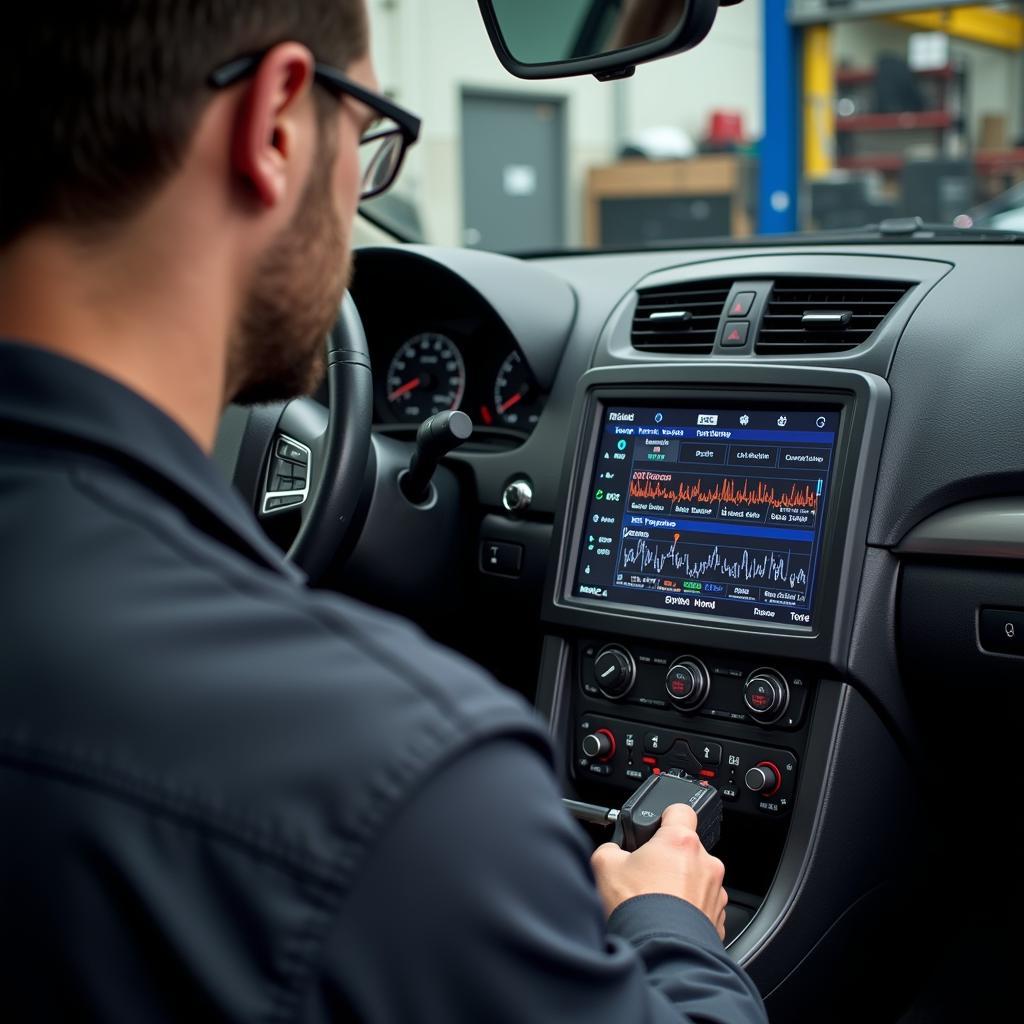A diagnostic car testing machine is an essential tool for any mechanic or car enthusiast. These sophisticated devices, also known as car computer diagnostic tests, can quickly and accurately identify issues within a vehicle’s various systems, from the engine and transmission to the brakes and airbags.
 Mechanic using a diagnostic car testing machine
Mechanic using a diagnostic car testing machine
Why are Diagnostic Car Testing Machines Important?
Modern vehicles are complex machines controlled by intricate electronic systems. When something goes wrong, pinpointing the exact cause can be like finding a needle in a haystack. That’s where a diagnostic car testing machine comes in.
These devices act as a window into your car’s computer, reading and interpreting data from various sensors to detect any anomalies. This information allows mechanics to diagnose problems quickly and efficiently, saving you time and money on unnecessary repairs.
How Does a Diagnostic Car Testing Machine Work?
Most diagnostic car testing machines connect to your vehicle’s OBD-II port, a standardized interface found in almost all cars manufactured after 1996. Once connected, the machine communicates with your car’s computer, retrieving diagnostic trouble codes (DTCs) and live data streams.
DTCs are essentially error codes stored in your car’s computer, each representing a specific issue detected by the vehicle’s sensors. Live data streams provide real-time information on various engine and system parameters, such as engine speed, coolant temperature, and oxygen sensor readings.
Types of Diagnostic Car Testing Machines
There is a wide range of diagnostic car testing machines available, from basic code readers to advanced professional-grade systems.
- Basic Code Readers: These affordable and easy-to-use devices can read and clear basic DTCs, making them ideal for DIY enthusiasts.
- Mid-Range Scanners: Offering more advanced features than basic code readers, mid-range scanners can access live data streams, perform actuator tests, and provide manufacturer-specific codes for more in-depth diagnostics.
- Professional-Grade Diagnostic Machines: These top-of-the-line systems offer comprehensive diagnostic capabilities, including advanced programming functions, bidirectional control over vehicle systems, and access to technical service bulletins.
Choosing the Right Diagnostic Car Testing Machine
The best car diagnostic testing machine for you will depend on your specific needs and budget. If you’re a DIY enthusiast who wants to perform basic diagnostics, a basic code reader or mid-range scanner may suffice.
However, if you’re a professional mechanic or a serious car enthusiast, investing in a professional-grade computer for diagnostic car will provide you with the advanced tools and capabilities needed for comprehensive diagnostics and repairs.
Benefits of Using a Diagnostic Car Testing Machine
Utilizing a diagnostic car testing machine offers numerous benefits:
- Faster and More Accurate Diagnostics: Quickly pinpoint the root cause of car problems, eliminating guesswork and unnecessary repairs.
- Cost Savings: Avoid costly trial-and-error repairs by identifying the exact issue the first time.
- Preventative Maintenance: Monitor your vehicle’s health and address minor issues before they escalate into major problems.
- Increased Resale Value: Maintaining a well-documented service history with a diagnostic car testing machine can increase your car’s resale value.
Conclusion
A diagnostic car testing machine is an invaluable tool for anyone who owns or works on cars. With its ability to quickly and accurately diagnose vehicle issues, a car diagnostic fault assistant can save you time, money, and frustration in the long run.
Whether you’re a seasoned mechanic or a DIY enthusiast, investing in the right diagnostic car testing machine can help you stay on top of your car’s health and keep it running smoothly for years to come.